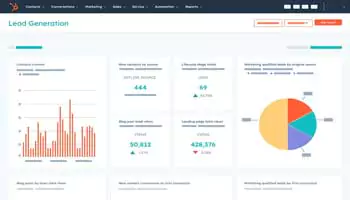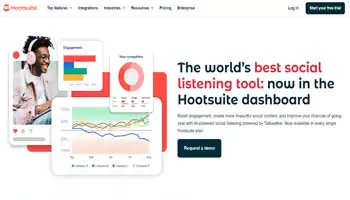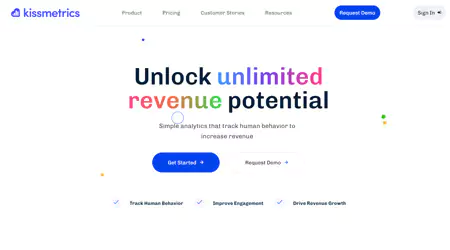Contents
- 1 Understanding the Data Analysis
- 2 Types of Data Analysis in Digital Marketing
- 3 Tools Used for Data Analysis in Digital Marketing
- 4 Google Analytics
- 5 SEMrush Tool for Data Analysis and Keyword Research
- 6 HubSpot Data Analysis Tool
- 7 Tableau Data Analysis Tool
- 8 Hootsuite Insights Data Analysis Tool
- 9 Kissmetrics Data Analysis Tool
- 10 Data Analysis Outcomes in Digital Marketing
- 11 The Future of Data Analysis
- 12 Conclusion of Data Analysis
- 13 FAQs About Data Analysis
In the digital age, data analysis is more than just numbers and charts—it’s the heartbeat of any successful marketing strategy. Understanding how to analyze this data can transform a business, giving marketers the emotional thrill of truly connecting with their audience. Imagine being able to peek into the minds of your customers, to know what they love, what they need, and how to reach them most effectively. This is the power of data analysis in digital marketing.
Understanding the Data Analysis
Data analysis is the systematic process of inspecting, cleansing, transforming, and modeling data to discover useful information, draw conclusions, and support decision-making. It’s the bridge that connects raw data to actionable insights, turning chaos into clarity.
How Data Analysis Works?
Data analysis involves collecting data from various sources, processing it to remove noise and inconsistencies, analyzing it using statistical and computational techniques, and interpreting the results to guide business strategies.
Key Benefits of Data Analysis: The benefits are manifold: improved decision-making, increased operational efficiency, enhanced customer insights, and the ability to predict future trends. Data analysis empowers businesses to be proactive rather than reactive, turning potential threats into opportunities.
Types of Data Analysis in Digital Marketing
Descriptive Analysis
Descriptive analysis is like looking back at a photo album of your past marketing efforts. It answers the question, “What happened?” by summarizing historical data to identify patterns and trends. This method helps marketers understand their past performance, providing a clear picture of what worked and what didn’t. For instance, analyzing past email campaigns might reveal that subject lines with emojis have higher open rates.
Diagnostic Analysis
When something goes wrong, diagnostic analysis is your detective. It delves deeper into the data to answer, “Why did it happen?” By identifying the factors that influenced certain outcomes, this method helps marketers understand the causes behind the trends. If a sudden drop in website traffic occurs, diagnostic analysis might uncover issues like broken links or changes in search engine algorithms.
Predictive Analysis
Looking into the future is no longer the stuff of science fiction. Predictive analysis uses historical data to forecast future trends, answering, “What could happen?” By applying statistical models and machine learning algorithms, marketers can predict customer behavior, such as which products are likely to be popular in the coming months. This foresight allows businesses to stay ahead of the curve and meet customer needs proactively.
Prescriptive Analysis
Prescriptive analysis goes one step further, suggesting actions based on data insights. It answers the question, “What should we do?” By considering various scenarios and their potential outcomes, this method provides actionable recommendations. For example, if data shows that personalized email campaigns yield higher conversion rates, prescriptive analysis might suggest implementing more personalized marketing strategies.
Sentiment Analysis
Understanding customer emotions can be a game-changer. Sentiment analysis examines customer feedback, social media posts, and reviews to gauge public sentiment. It answers, “How do customers feel?” By analyzing the tone and emotion behind the words, marketers can better understand their audience’s feelings and perceptions. This emotional insight is invaluable for crafting messages that resonate deeply with customers.
Tools Used for Data Analysis in Digital Marketing
In the dynamic world of digital marketing, data analysis stands as a crucial pillar for informed decision-making and strategic planning. The array of tools available for data analysis transforms raw data into actionable insights, enabling marketers to fine-tune their strategies for maximum impact. From Google Analytics and SEMrush to Tableau and Power BI, these tools offer robust functionalities that help in tracking performance, understanding customer behavior, and predicting future trends. By leveraging these powerful data analysis tools, digital marketers can gain a competitive edge, ensuring their campaigns are not only effective but also efficient in reaching the right audience at the right time.
Google Analytics
Google Analytics is more than just a tool; it’s the key to unlocking a deeper understanding of your online presence. Imagine having the ability to see exactly how visitors interact with your website, pinpointing which pages capture their interest and which ones lead them to click away. This insight is invaluable for any business looking to thrive in the digital landscape. With Google Analytics, you’re not just tracking numbers; you’re uncovering stories. Each metric represents a piece of the puzzle, revealing the behaviors, preferences, and journeys of your audience.

It’s like having a backstage pass to your own website, where you can see what truly resonates with your visitors and what needs improvement. The emotional impact of this knowledge is profound—it empowers you to make data-driven decisions that can transform your online strategy and foster a more engaging, user-centric experience.
But the magic of Google Analytics doesn’t stop there. It offers a plethora of features that cater to every aspect of your digital marketing efforts. From real-time tracking that lets you see who’s on your site at any given moment to detailed reports that break down traffic sources, user demographics, and conversion rates, Google Analytics provides a comprehensive view of your digital ecosystem.
This depth of insight allows you to fine-tune your marketing campaigns, optimize your content, and ultimately, achieve your business goals with greater precision. The emotional reward of seeing your efforts pay off—higher engagement rates, increased conversions, and loyal customers—is immeasurable.
Google Analytics isn’t just a tool; it’s your digital marketing partner, guiding you with the clarity and confidence needed to succeed in an ever-evolving online world. It provides comprehensive insights into website traffic, user behavior, and conversion rates. With its powerful features, marketers can track visitor interactions, identify popular content, and measure the effectiveness of marketing campaigns.
SEMrush Tool for Data Analysis and Keyword Research
SEMrush is not just another digital marketing tool; it’s your secret weapon in the fiercely competitive online world. Imagine having the ability to spy on your competitors, uncovering their most successful keywords and strategies, and then using that knowledge to outperform them. That’s the power of SEMrush. It’s like having a seasoned digital marketing expert by your side, guiding you through the complexities of SEO, PPC, content marketing, and social media management.

The emotional satisfaction of watching your website climb the search engine rankings, knowing that you have the upper hand over your competitors, is unparalleled. With SEMrush, you’re not just guessing what might work—you’re leveraging hard data and expert insights to drive real, measurable success.
But the magic of SEMrush goes beyond competitive analysis. It’s a comprehensive toolkit that empowers you to take control of your entire digital marketing strategy. From keyword research and backlink analysis to site audits and position tracking, SEMrush provides a wealth of data that helps you optimize every aspect of your online presence.
Imagine the thrill of discovering a high-volume keyword that perfectly matches your niche or identifying a technical issue on your site that’s been holding you back. The sense of empowerment and confidence that comes from making informed, data-driven decisions is transformative.
With SEMrush, you’re not just keeping up with the digital marketing game—you’re leading it, armed with the insights and tools you need to achieve your goals and exceed your expectations. It offers detailed reports on keyword rankings, backlinks, and domain performance. Marketers can use SEMrush to spy on competitors, uncovering their strategies and identifying opportunities for improvement.
HubSpot Data Analysis Tool
HubSpot is more than just a marketing platform; it’s the heart and soul of a business’s customer relationship strategy. Imagine having a single, intuitive interface where you can manage your entire customer journey—from the first touchpoint to long-term relationship building. HubSpot provides this seamless experience, integrating marketing, sales, and service tools into one powerful system. The emotional impact of this unity cannot be overstated.

It’s like having a personal assistant who remembers every detail about your clients, helping you deliver personalized and meaningful interactions at every stage. With HubSpot, you can craft compelling email campaigns, manage social media presence, and analyze detailed reports—all designed to deepen your connection with your audience and drive business growth.
But HubSpot’s magic lies in its ability to turn complex processes into simple, actionable tasks. It empowers businesses to attract, engage, and delight customers with ease and efficiency. Imagine the joy of seeing a lead nurtured through your automated workflows, converting into a loyal customer who feels valued and understood.
HubSpot’s robust CRM capabilities ensure that no opportunity slips through the cracks, providing sales teams with the tools to close deals faster and more effectively. The emotional reward of seeing your marketing efforts translate into tangible results—like increased website traffic, higher conversion rates, and satisfied customers—fuels your passion and drives your business forward. HubSpot isn’t just a tool; it’s your partner in creating a cohesive, customer-centric strategy that inspires loyalty and fosters long-term success.
HubSpot is an all-in-one inbound marketing and sales platform. It combines tools for email marketing, social media management, and CRM. HubSpot’s analytics feature helps marketers track the performance of their campaigns and gain insights into customer journeys.
Tableau Data Analysis Tool
Tableau is not just a data visualization tool; it’s a window into the heart of your data, transforming complex information into compelling, easy-to-understand visual stories. Imagine the power of taking raw, intricate datasets and converting them into dynamic dashboards that reveal insights at a glance. Tableau does just that, allowing you to see the patterns and trends hidden within your data with unparalleled clarity. This emotional connection to your data can be transformative—it’s like turning on a light in a dark room, suddenly everything makes sense.

With Tableau, you can dive deep into your metrics, uncovering the narratives that drive your business decisions and strategies. The intuitive drag-and-drop interface makes it easy for anyone, regardless of technical skill, to create stunning visualizations that not only inform but also inspire action.
But Tableau’s magic extends beyond just visual clarity. It fosters a deeper, more emotional connection with your data by making it interactive and accessible to everyone in your organization. Imagine the thrill of collaborating with your team, each member exploring and contributing their unique insights through shared dashboards and reports. Tableau’s ability to connect to a vast array of data sources means you can pull in information from anywhere, creating a holistic view of your business landscape.
This comprehensive perspective empowers you to make data-driven decisions with confidence and precision. The emotional satisfaction of seeing your business grow and thrive, driven by clear, actionable insights, is profound. Tableau doesn’t just show you your data; it tells the story of your business, helping you navigate the complex world of analytics with confidence and ease.
Tableau is a powerful data visualization tool that turns complex data into interactive, easy-to-understand visualizations. Marketers can create stunning dashboards that highlight key metrics and trends, making it easier to communicate insights to stakeholders.
Hootsuite Insights Data Analysis Tool
Hootsuite Insights is a powerful tool that transforms how you understand and interact with your social media audience. Imagine being able to see beyond the likes and shares, diving deep into the emotions and conversations that define your brand’s online presence. Hootsuite Insights does just that, offering detailed analytics and sentiment analysis that reveal what your audience truly thinks and feels about your content. This level of understanding is invaluable—it’s like having a conversation with thousands of customers at once, each one telling you exactly what they love and what they want to see more of.

With Hootsuite Insights, you can track brand mentions, analyze competitor performance, and identify key trends, allowing you to craft more engaging and effective social media strategies. But the magic of Hootsuite Insights extends beyond data collection. It empowers you to act on the insights you gain, making real-time adjustments to your social media campaigns. Imagine the confidence of knowing exactly when to post, what hashtags to use, and which topics will resonate most with your audience. Hootsuite Insights provides this clarity, enabling you to enhance your engagement and grow your social media presence strategically.
The tool’s user-friendly interface and comprehensive reporting features ensure that you can share these valuable insights with your team, fostering a collaborative approach to social media management. With Hootsuite Insights, you’re not just monitoring your social media channels; you’re actively shaping the conversation and driving meaningful interactions with your audience. It tracks engagement, mentions, and sentiment across various social platforms. This tool helps marketers understand how their social media efforts are performing and how to improve their online presence.
Kissmetrics Data Analysis Tool
Kissmetrics is a game-changer for businesses that crave a deep understanding of their customer journey. Unlike other analytics platforms that offer broad overviews, Kissmetrics dives into the granular details of individual user behaviors. Imagine tracking a customer’s interaction from the moment they land on your site, through every click, scroll, and page visit, all the way to their final purchase. Kissmetrics provides this level of detailed insight, allowing you to see not just what your users are doing, but also how and why they’re doing it.

This capability transforms raw data into rich, actionable insights, giving you the power to optimize your marketing strategies with precision. It’s like having a microscope on your customers’ journey, highlighting every critical moment that influences their decisions.
Beyond just tracking, Kissmetrics empowers you to leverage this data for smarter decision-making and improved user engagement. Imagine having the confidence to refine your marketing campaigns based on concrete evidence, knowing exactly which tactics are driving conversions and which need adjustment.
Kissmetrics offers robust features such as cohort analysis, funnel reports, and customer segmentation, enabling you to break down your audience into meaningful groups and tailor your approaches accordingly. This ensures that your marketing efforts are not only effective but also highly personalized, fostering stronger relationships and loyalty. The intuitive interface and comprehensive reporting tools make it accessible for teams across your organization, promoting a culture of data-driven excellence. With Kissmetrics, you’re not just observing your business performance—you’re actively enhancing it, leading to higher customer satisfaction and sustainable growth.
Data Analysis Outcomes in Digital Marketing
Improved Customer Understanding
Data analysis transforms raw data into rich insights about your customers. By creating detailed buyer personas, marketers can better understand their audience’s demographics, interests, and behaviors. This deep understanding allows for more targeted and effective marketing strategies.
Enhanced Campaign Performance
With data-driven insights, marketers can refine their campaigns for better performance. By identifying which tactics yield the best results, businesses can optimize their strategies and allocate resources more effectively. For instance, data might reveal that video content performs better than blog posts, leading to a shift in content strategy.
Increased ROI
Effective data analysis facilitates smarter budget allocation, ensuring that marketing expenditures are directed towards the most impactful areas. By identifying and focusing on high-performing channels and tactics, businesses can optimize their marketing efforts, ultimately achieving a higher return on investment (ROI). This strategic approach not only maximizes the efficiency of marketing dollars but also enhances overall business performance by concentrating resources on the most successful and profitable activities.
Better Content Strategy
Data insights enable marketers to understand what types of content resonate most with their audience, allowing for the creation of more engaging and relevant material. By tailoring content to match audience preferences, businesses can enhance their content strategy, ensuring it effectively captures and retains attention. For instance, if data reveals that how-to guides and tutorials are particularly popular among customers, marketers can focus on producing more of this content type to drive engagement and satisfaction. This data-driven approach ensures that content not only meets but exceeds audience expectations, fostering stronger connections and boosting overall marketing effectiveness.
Social Media Engagement
Understanding the factors that drive engagement on social media is essential for establishing a robust online presence. Through data analysis, marketers can uncover which types of posts, hashtags, and times of day generate the highest levels of interaction. Armed with this knowledge, they can craft strategies that resonate more effectively with their audience, fostering deeper connections, loyalty, and trust. By leveraging insights derived from data, businesses can enhance their social media efforts, ensuring their content not only reaches but also engages and retains their target audience.
Choosing the Right Type of Data Analysis
Selecting the appropriate type of data analysis is crucial and should align with your business needs and objectives. Whether your goal is to understand past performance, diagnose existing problems, predict future trends, or optimize decision-making processes, the type of analysis you choose must be tailored to achieve these specific outcomes. By clearly defining what you aim to accomplish, you can ensure that the analysis method you employ will provide the most relevant and actionable insights for your business.
The Future of Data Analysis
The future of data analysis is nothing short of bright and exciting. As we move further into the digital age, the rise of Big Data, AI, and machine learning is revolutionizing how we approach and interpret data. These advancements are making data analysis more sophisticated and powerful than ever before. Big Data allows for the collection and processing of vast amounts of information from various sources, providing a more comprehensive understanding of trends and patterns.
AI and machine learning, on the other hand, are transforming how we analyze this data, offering predictive insights and automating complex processes. This means that businesses can not only understand what has happened but also predict what is likely to happen next, making data analysis an indispensable tool for strategic planning and decision-making.
Real-time data analysis is also gaining significant importance in this evolving landscape. The ability to analyze data as it is generated enables businesses to make instant decisions, responding to market changes and customer behaviors more swiftly than ever. This agility is crucial in today’s fast-paced world, where staying ahead of the competition often depends on how quickly and effectively a company can adapt to new information.
Real-time data analysis helps organizations identify opportunities and threats as they emerge, allowing for proactive measures rather than reactive ones. This capability transforms data from a static record of past events into a dynamic asset that drives immediate and impactful business actions. As technology continues to advance, the future of data analysis promises even greater innovations, making it an exciting field full of potential and endless possibilities.
Conclusion of Data Analysis
Data analysis in digital marketing is like having a treasure map that leads you to the heart of your audience. By understanding the methods and tools available, marketers can unlock insights that drive meaningful connections and business success. As the digital landscape continues to evolve, the role of data analysis will only become more critical. Embrace it, and you’ll not only understand your audience better but also forge emotional connections that resonate deeply.
FAQs About Data Analysis
What is the most important method of data analysis in digital marketing?
Predictive analysis is crucial because it helps forecast future trends and customer behaviors, allowing marketers to stay ahead of the curve.
How can small businesses benefit from data analysis tools?
Small businesses can use data analysis tools to gain insights into customer behavior, optimize marketing campaigns, and allocate resources more effectively, leading to increased ROI.
Are there any free tools for data analysis in digital marketing?
Yes, tools like Google Analytics and Hootsuite offer free versions with essential features that can benefit small businesses and startups.
How often should data analysis be conducted?
Data analysis should be an ongoing process. Regular analysis—daily, weekly, or monthly—ensures that marketers stay updated with trends and can make timely adjustments to their strategies.
What are the biggest challenges in data analysis for digital marketing?
The biggest challenges include data quality, integration of different data sources, and the need for skilled analysts to interpret the data accurately.

